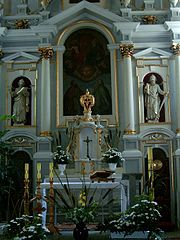
A History Of The Mass And Its Ceremonies In The Eastern And Western Church -Rev John O'Brien A.M.
RESERVATION OF THE HOLY EUCHARIST BY THE ORIENTALS
The Greek Church reserves the Holy Eucharist in a little satchel placed near the main altar, in what is termed the Artophorion, and keeps a light constantly burning before it (Goar, Euchol. Græc., 15). When conveying it to the sick as the Holy Viaticum, the priest must always be preceded by two deacons with torches in their hands, who keep up a continual recital of psalms the whole way. In some places the law of the land requires all to kneel down on such occasions until the Blessed Sacrament has passed, and this whether the parties who come in the way be Turks, Jews, or heathens (Martène, De Antiq. Eccl. Rit., q. 2).
The Abyssinians reserve the Blessed Sacrament in what they call the Tabout, or ark, for a tradition of long standing among them says that the real “Ark of the Covenant” is yet preserved in their land; and hence their desire to perpetuate the fact by applying the name to the tabernacle in which the Blessed Sacrament is kept. The prayer for the consecration of this ark is thus given in the Ethiopic Canon: “O Lord our God, who didst command Moses thy servant and prophet, saying, ‘Make me precious vessels, and put them in the tabernacle on Mount Sinai,’ now, O Lord God Almighty, stretch forth thy hand upon this ark, and fill it with the virtue, power, and grace of thy Holy Ghost, that in it may be consecrated the Body and Blood of thine only-begotten Son, our Lord” (Neale, Holy Eastern Church, i. 186; Renaudot, Liturg. Orient., i. p. 474).
The Copts never reserve the Blessed Eucharist outside of Mass; and they defend their strange discipline by saying that it was forbidden the chosen people of old to reserve any portion of the paschal lamb from one day to another, but that all of it had to be consumed at one meal. So that if a Coptic priest should be summoned any time of the day or night to the bed of a dying person, in order to procure the Holy Viaticum, he will say Mass, whether fasting or not, without the slightest scruple (Denzinger, Ritus Orientalium, p. 86). There are two other reasons, however, besides the one mentioned, for this strange discipline. The first is that, inasmuch as the Copts are wholly under dominion of the Mahometans, they are apprehensive that the latter might break into their churches at any time and offer insult to the Blessed Sacrament. The second reason why they do not reserve it, is owing to a strange fear they have that it might be devoured by some of those treacherous serpents for which their land is remarkable. An accident of this kind happened once, and ever since the Coptic patriarchs have forbidden all reservation of the Blessed Sacrament outside of Mass (ibid.)
Copyright ©1999-2023 Wildfire Fellowship, Inc all rights reserved

 Keep Site Running
Keep Site Running